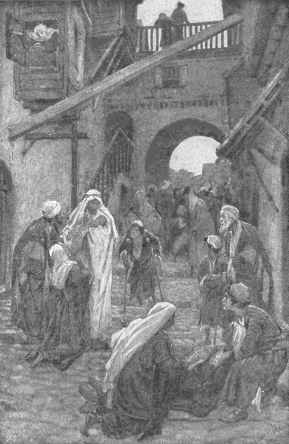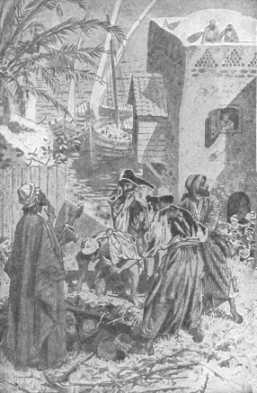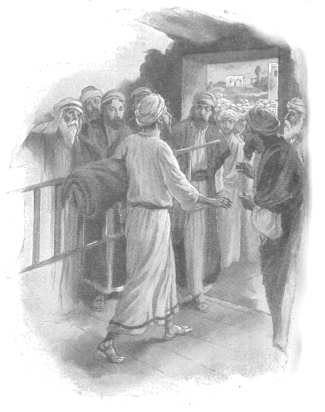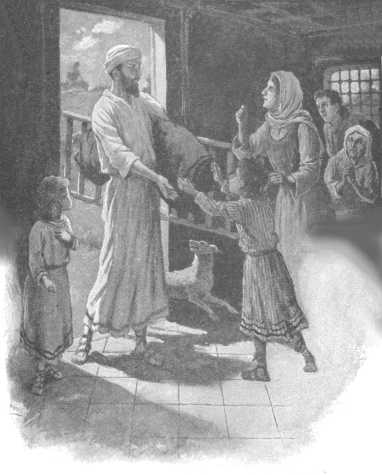Man let down through roof 1
Call of Matthew 13
Fasting; new cloth patches; new wine 18
Lord of the Sabbath 23
|
|
|
|
|
|
 .1
¶ And again he entered into Capernaum after some days; and it was
noised that he was in the house. .1
¶ And again he entered into Capernaum after some days; and it was
noised that he was in the house.
2 And straightway many were gathered together, insomuch that there was no room to receive them, no, not so much as about the door: and he preached the word unto them. 3 And they come unto him, bringing one sick of the palsy, which was borne of four.  .4
And when they could not come nigh unto him for the press, they uncovered
the roof where he was: and when they had broken it up, they let down the
bed wherein the sick of the palsy lay. .4
And when they could not come nigh unto him for the press, they uncovered
the roof where he was: and when they had broken it up, they let down the
bed wherein the sick of the palsy lay.
.5 When Jesus saw their faith, he said unto the sick of the palsy, Son, thy sins be forgiven thee. 1 - Capernaum See Galilee map, north edge. 2 - Preached the word He taught them from the Scriptures – our Old Testament. 3 - Palsy He was at least partly paralyzed. 4 - Uncovered the roof This must have caused some degree of distraction for those inside. The man's friends were clearly in earnest. Perhaps he was near death. 5 - Saw ... faith Jesus response to that faith was forgiveness. With divine insight He knew the cry of the man's heart. Wrong lifestyles often bring disease. It would have been a denial of the importance of the laws of health to heal while a person had no commitment to change behavior. |
|
| .6
But there were certain of the scribes sitting there, and reasoning in their
hearts,
7 Why doth this man thus speak blasphemies? who can forgive sins but God only? 8 And immediately when Jesus perceived in his spirit that they so reasoned within themselves, he said unto them, Why reason ye these things in your hearts? |
6 -
Scribes
Luke describes them as "Pharisees and doctors of the law" who had come
from "Galilee, and Judaea, and Jerusalem." lu0517.
They had apparently assembled to discuss this new teacher who had been
popular in their various areas. We may see this group as spies sent to
find reason to accuse Him. Compare jn0119.
Notice that they were "reasoning" silently.
7 - This man Literally, "This one" as in contempt. 7 - Speak blasphemies? But this good "evidence" was not presented at His trial a year and a half later mt2659, mr1455. |
 9
Whether is it easier to say to the sick of the palsy, Thy sins be forgiven
thee; or to say, Arise, and take up thy bed, and walk? 9
Whether is it easier to say to the sick of the palsy, Thy sins be forgiven
thee; or to say, Arise, and take up thy bed, and walk?
.10 But that ye may know that the Son of man hath power on earth to forgive sins, (he saith to the sick of the palsy,) 11 I say unto thee, Arise, and take up thy bed, and go thy way into thine house. 12 And immediately he arose, took up the bed, and went forth before them all; insomuch that they were all amazed, and glorified God, saying, We never saw it on this fashion. 10 - Son of man This title which Jesus used emphasizes His human nature ro0103, ga0404. He stood in our place that we might become sons of God! jn0112, 1jo0301. We were made in the image of God, lost that character in Eden, and may now be restored in Christ. Jesus often used the term to represent Himself but no other person or gospel writer did. It represents His humanity. It may be seen as a Messianic title based on the promise of a "child" who was to be born to "us." is0906. Compare lu0211. Precious gift !! He was God in human flesh jn0114, ph0206 that we might become human sons of God jn0112, ga0403, 1jo0301.  10
- Power on earth to forgive Greek
exousia which primarily
means "authority." This authority was based on His coming death for the
sins of the world. Only He opens the tomb jn0522.
Only He opens the gates of heaven mt2534.
No human priest has the qualifications and authority to forgive sins. The
words, "on earth," imply that Jesus had come from heaven jn0638. 10
- Power on earth to forgive Greek
exousia which primarily
means "authority." This authority was based on His coming death for the
sins of the world. Only He opens the tomb jn0522.
Only He opens the gates of heaven mt2534.
No human priest has the qualifications and authority to forgive sins. The
words, "on earth," imply that Jesus had come from heaven jn0638.
11 - To thee I say The word order in Greek is "To thee I say soi lego. He was no longer speaking to the Scribes. 12 - Immediately he arose The man had come to Christ feeling his great need of spiritual as well as physical healing and was satisfied de0429. |
|
|
|
|
| .13
¶ And he went forth again by the sea side; and all the multitude resorted
unto him, and he taught them.
14 And as he passed by, he saw Levi the son of Alphaeus sitting at the receipt of custom, and said unto him, Follow me. And he arose and followed him. |
13
- Went forth This was not a major tour. It is also recorded
beginning at mt0909, lu0527.
14 - Levi This was Matthew mt0909 (above). To see why he collected duty, look at the passage in Matthew. |
|
|
|
|
.16 And when the scribes and Pharisees saw him eat with publicans and sinners, they said unto his disciples, How is it that he eateth and drinketh with publicans and sinners? .17 When Jesus heard it, he saith unto them, They that are whole have no need of the physician, but they that are sick: I came not to call the righteous, but sinners to repentance. 15 - Jesus sat This episode is also recorded at mt0910, lu0529. The word for "sat" is katakeimai, to lay down. At the time of Jesus, lying on couchs sloping away from the table was the accepted way to eat at a special dinner. It must have been very uncomfortable. The words "at meat" were supplied by translators. 15 - Publicans Meaning "tax collectors" or "revenue agents." The "sinners" mentioned in this verse are discussed in v17. |
16 - Scribes and Pharisees Other manuscripts read "scribes of the Pharisees." That is, scribes who were Pharisees." Some were Sadducees. 16 - Eateth and drinketh This was forbidden by the Jewish ritual law and required a purification process. ac1103. Tax collectors worked for the Roman government and were probably considered traitors to the Jewish objective of conquering the Empire. Thus they were also "sinners." 17 - They that are whole [healthy] have no need No one could argue with this. Those who accused Jesus should have been working to rescue the souls of sinners mt0121. 17 - Not to call the righteous Of course the Pharisees were not righteous but they claimed to be so for following their man-made rules. They had nothing to say. Appeals of Christ are futile for those who feel no need of His righteousness. Later, Jesus clarified that their ceremonies were worthless. See mt0530, mt2431. And the Pharisees had been guilty of the sins for which they accused the publicans mt1344, mr0911. The publicans were more receptive lu1808. |
|
|
|
| .18
¶ And the disciples of John and of the Pharisees used to fast: and
they come and say unto him, Why do the disciples of John and of the Pharisees
fast, but thy disciples fast not?
.19 And Jesus said unto them, Can the children of the bride chamber fast, while the bridegroom is with them? as long as they have the bridegroom with them, they cannot fast. 20 But the days will come, when the bridegroom shall be taken away from them, and then shall they fast in those days. 18 - The question about fasting also appears beginning at mt0614, lu0213. 18 - Used to fast Or "were fasting." John's disciples would likely have followed the principle of avoiding harmful foods and of simple eating habits mt1344. According to mt0614, they were the ones who asked the question. This was probably shortly before John was killed. See mt2401, mt0614, lu0913, and note below. |
19
- Children of the bride chamber A contemporary Jewish idiom
for wedding guests. In the OT, Yahweh was the groom of His people is2405,
co0102.
The Baptist had already used used the metaphor in explaining the ministry
of Jesus
jn0129. His
disciples would have understood Jesus' remark.
The idea of rejoicing was not in conflict with the laws He had given to Israel through Moses jn0858, mt0517, lu1714. The difference was in the laws that had been added by the religious leaders mt2304. They were against the true spirit of the laws of Moses mt1503. The disciples of John the Baptist had followed some of the Jewish traditional rules and Jesus wanted them and His own followers to understand. Thus the idea of the wedding, the new cloth and the new wine, He showed how the rabbinical rituals were not compatible with the the true principles of the Scriptures. See mt0538. Also see the note below on fasting. 20 - Days will come The "wedding" of His time on earth would end. jn0314. |
| 21 No man also seweth
a piece of new cloth on an old garment: else the new piece that filled
it up taketh away from the old, and the rent is made worse.
22 And no man putteth new wine into old bottles: else the new wine doth burst the bottles, and the wine is spilled, and the bottles will be marred: but new wine must be put into new bottles. |
21
- Seweth ... new cloth It would not be successful to patch
the perverted Jewish system with the fabric of Christ's teachings lu0536.
21 - New Greek agnaphos. Literally "uncarded." Here it would be seen as unshrunk or unbleached. It would be "made worse" when it got wet or when the strong fabric pulled against the stitches into the old garment. 22 - New wine Or unfermented wine. See on ac0233, lu0136. 22 - Bottles These would have been skins of small animals like goats with the neck as a spout. "New bottles" would be receptive people and a form of worship without the rituals that had been added to the simple system God had given. |
|
|
|
| .23
And it came to pass, that he went through the corn fields on the sabbath
day; and his disciples began, as they went, to pluck the ears of corn.
.24 And the Pharisees said unto him, Behold, why do they on the sabbath day that which is not lawful? 25 And he said unto them, Have ye never read what David did, when he had need, and was an hungred, he, and they that were with him? 26 How he went into the house of God in the days of Abiathar the high priest, and did eat the shewbread, which is not lawful to eat but for the priests, and gave also to them which were with him? .27 And he said unto them, The sabbath was made for man, and not man for the sabbath: .28 Therefore the Son of man is Lord also of the sabbath. |
23
- Went through Literally "Went beside." They may have been
on a path and wouldn't have been trampling the plants.
23 - Corn That is "grain." It would have been wheat or barley. 24 - Sabbath day ... unlawful According to de2115 a hungry person could eat grain while passing by although the Sabbath is not mentioned in the rule. Among the many Sabbath rules of the Mishnah are prohibitions against gathering and threshing grain. (Sabbath 7:2. Sonic ed. of the Talmud, pp. 348, 349.) This was probably the basis of the objection. 25 - Have ye never read According to their accusation, they were missing something. If David had not been condemned for eating the shewbread in order to satisfy his need, at the time, for food, then the simple shelling out and eating of grain to sustain them in their witness would certainly be justified. 27 - Sabbath for man Some think God's seventh day rest is only for the Jews. Here Jesus declared it to be for humanity, Greek anthropoids. It was the seventh day of creation week and to be for physical and spiritual rest, a blessing for humanity. 27 - For man Or "for the sake of man." 28 - Lord of the Sabbath Does this mean His day is "the Lord's day"? See on mt1208. |
|
Is the Bible account at verse 26 in error? Bart D. Ehrman, as a student in Princeton University, was assigned the task of reconcilling the apparent error between the account above, verses 25-28, and the account in 1 Samuel 21:1-6. Mark 2:26 here clearly points to David's entry into the temple as in the days of Abiathar the high priest but the text in 1 Samuel says specifically that David went to the high priest Ahimelech. Actually both are true. The words, "days of," denote a time span, apparently the lifetime of Abiathar. Ehrman became critical of the Bible and taught that it was full of errors. He didn't love truth. See 2 Thess. 2:10-11. |
|
| Previous | Next | Mark home | Commentary home | Contact |
|
Centuries earlier the prophets had warned against the abuse of fasts and other religious observances. is4003, re0705. Fasting is often beneficial because, with the digestive system at rest, the mind is clear. Thus prayer is sincere and, while meditating on the Scriptures, the mind is receptive to the leading of the Holy Spirit. Of course the body needs food and fasting should not be too long. It is also important to continue drinking water, and medical needs should not be ignored. mt0616, da1002. |